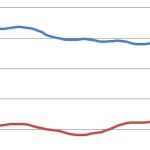The Pension Disaster Will Be Addressed
Springboarding from the woes of California’s public-sector pension problems, The American Interest suggests that it might be too late to avoid some sort of crisis with such pensions across the country:
This long-running failure of governance may be irreversible. All that’s left for state governments to do now is reform pension systems for new employees, phasing out defined-benefit systems for 401(k)-style plans, and, where possible, trim benefits or raise contribution requirements for current workers. In the meantime, federal policymakers should start thinking about a reform-for-relief framework that will enable states and localities to honor their obligations to retirees while getting their finances back under control for the long haul.
We should consider it evidence of the extent of the problem that the generally wise American Interest falls back to the irresponsible cop-out that the federal government ought to step in and make the problem go away — as if the feds aren’t already headed toward dozens of trillions of dollars in debt absorbing every other bad policy decision made throughout the country over the past century. That is, pensioners relying on the writer’s solution would have to hope that none of the other myriad problems and looming crises comes to a head and absorbs the nation’s very last tolerance for debt before the pension problem. (My wager is that the multiple crises will cascade into one uber crisis.)
If the idea of the government takething away the pensions that it gavethed is inconceivable, peruse the ruling issued this week by Rhode Island Superior Court Judge Sarah Taft-Carter (internal citations removed):
It was clear that to avert disaster the City had to act. (p. 11)…
Notwithstanding a finding of substantial impairment, a contract modification remains constitutionally valid if the City produces sufficient credible evidence that the modification was done to further a significant and legitimate public purpose and if doing so was reasonable and necessary. (p. 30)…
… the Court is satisfied that the City has produced sufficient credible evidence through the testimony of Mayor Fung, Mr. Strom, and Mr. Sherman that the Great Recession, the decline in state aid, and RIRSA’s requirements created an unprecedented fiscal emergency neither created nor anticipated by the City. (p. 34)
Taft-Carter affirmed that cities cannot be expected to raise taxes indefinitely, and unless I missed it, she didn’t so much as speculate that the state could be forced to intervene. The same will prove true up the scale, all the way to our giant national blob of debt. At the state level, one could imagine a judge considering something like my argument about the flight of the “productive class” as evidence that higher taxes would accelerate a death spiral already underway.
For those who think the same couldn’t happen at the federal level, one can only suggest that they not take the risk of finding out.


